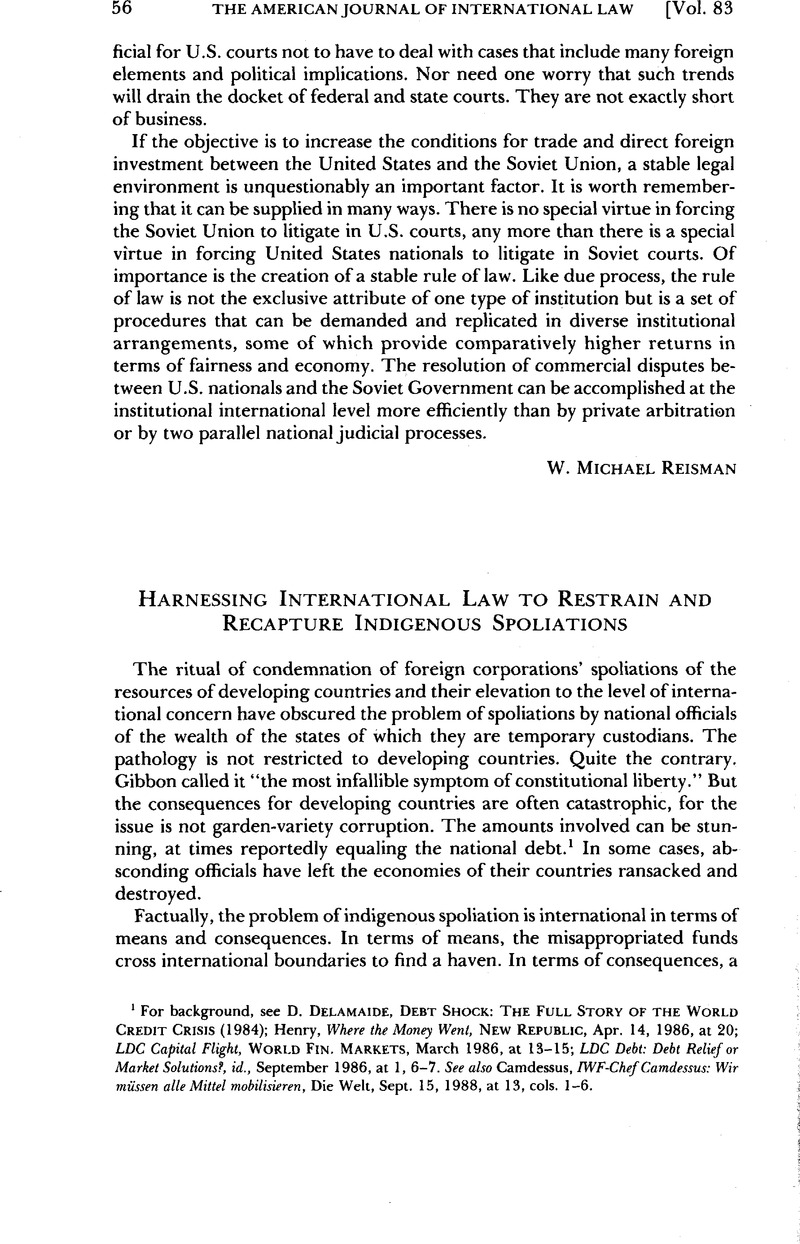Published online by Cambridge University Press: 27 February 2017

1 For background, see D. Delamaide, Debt Shock: The Full Story of the World Credit Crisis (1984); Henry, Where the Money Went, New Republic, Apr. 14, 1986, at 20; LDC Capital Flight, World Fin. Markets, March 1986, at 13–15; LDC Debt: Debt Relief or Market Solutions?, id., September 1986, at 1, 6–7. See also Camdessus, IWF-Chef Camdessus: Wir miissen alle Mittel mobilisieren, Die Welt, Sept. 15, 1988, at 13, cols. 1–6.
2 But cf. E. de Vattel, The Law of Nations, bk. I, ch. II, § 15; see also id., ch. IV, §§39, 49 (Carnegie trans. 1916) (1758).
3 Resolution on Permanent Sovereignty over Natural Resources, GA Res. 1803, 17 UN GAOR Supp. (No. 17) at 15, UN Doc. A/5217 (1962).
4 On the welfare function of contemporary international law, see Friedmann, Human Welfare and International Law—A Reordering of Priorities, in Transnational Law in a Changing Society 113 (1972). Wilfred Jenks, in The Common Law of Mankind (1958), wrote eloquently on this subject. Jenks described international law as “increasingly shifting from the formal structure of the relationships between States and the delimitation of their jurisdiction to the development of substantive rules on matters of common concern vital to the growth of an international community and to the individual well-being of the citizens of its member States.” Id. at 17.
For examples of specific relevant international instruments, see infra note 5.
5 Other relevant human rights instruments include the International Covenant on Economic, Social and Cultural Rights, GA Res. 2200, 21 UN GAOR Supp. (No. 16) at 49, UN Doc. A/6316 (1966), especially Art. 1(2); the International Covenant on Civil and Political Rights, GA Res. 2200, 21 UN GAOR Supp. (No. 16) at 52, UN Doc. A/6316 (1966), especially Art. 1(2):
All peoples may, for their own ends, freely dispose of their natural wealth and resources without prejudice to any obligations arising out of international economic co-operation, based upon the principle of mutual benefit, and international law. In no case may a people be deprived of its own means of subsistence [emphasis supplied].
In addition, the European Convention for the Protection of Human Rights and Fundamental Freedoms, Nov. 4, 1950, 213 UNTS 221, especially Art. 9 regarding freedom of information; the Final Act of the [Helsinki] Conference on Security and Co-operation in Europe, Aug. 1, 1975, 73 Dep’t St. Bull. 323 (1975), especially pt. VII, “Respect for Human Rights and Fundamental Freedoms,” and pt. VIII, “Equal Rights and Self-Determination of Peoples”; the American Declaration of the Rights and Duties of Man (1948), Res. XXX, 6 Ninth International Conference of American States, Actas y Documentos 297 (1953), especially Art. IV regarding freedom of investigation, opinion, expression and dissemination of ideas; the American Convention on Human Rights, Nov. 22, 1969, reprinted in Organization of American States, Handbook of Existing Rules Pertaining to Human Rights in the Inter-American System, OEA/Ser.L/V/II.65, doc. 6, at 103 (1985), especially Art. 13, “Freedom of Thought and Expression,” and Art. 21, “Right to Property.” These texts are also reproduced in I. Brownlie, Basic Documents on Human Rights (1981).
6 See generally W. M. Reisman, Folded Lies (1979); J. Noonan, Bribes (1984).